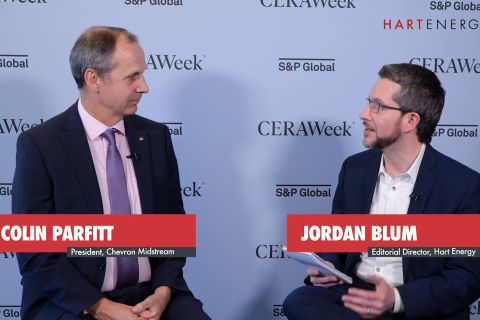
Source: Hart Energy
Baker Hughes Inc. (NYSE: BHI) is unloading some of its capital-heavy operations in preparation for the company's mega-merger with GE Oil & Gas. However, the deal for the company's pressure pumping fleet suggests Baker Hughes may be putting the cart before the horsepower.
On Nov. 29, Baker Hughes entered an agreement with private equity funds CSL Capital Management and Goldman Sachs’ West Street Energy Partners to form a new North American fracking company operating under the 144-year-old BJ Services brand.
The $325 million deal makes Baker Hughes a minority owner in its fleet, though just $150 million will go directly to its coffers. Some analysts questioned whether Baker Hughes settled for too little for its North American fracking assets. Others said shedding a potential cash flow-losing segment works in the company's favor.
The remaining $175 million will be used to run BJ Services.
In exchange, CSL Capital and West Street will own 53.3% of BJ Services. Baker Hughes will retain a 46.7% ownership stake.
Assuming no value for other equipment, Baker Hughes’ transaction gives its 1.9 million hydraulic horsepower (hhp) and its land stimulation business a value of $281 million, said Mike Kelly, senior analyst with Seaport Global Securities LLC.
That suggests that the company values the assets at $150 per hhp. Compared to roughly $1,000/hhp for a newbuild, Baker Hughes discounted its fleet by 85%, Kelly said in a Nov. 30 report.
At that price, the company appears to be divesting at “distressed-sale levels,” he said.
Baker Hughes and analysts said there are virtues to be found in slimming down, however.
The new BJ Services will start off with no debt and consist of about 1.9 million hhp and more than 240 cementing units following the combination of Baker Hughes’ North American land pressure pumping and cementing operations with CSL Capital-owned Allied Energy Services.
Baker Hughes previously indicated it was mulling a transaction, and the deal doesn’t come as much of a surprise, said Kurt Hallead, co-head of global energy research for RBC Capital Markets LLC.
The venture reduces the amount of capital that Baker Hughes needs to commit to maintain exposure to the North American fracturing business.
Hallead estimates that Baker Hughes’ land pressure pumping division generated annualized revenues of about $250 million.
“This is based on assumptions of historically low revenue per hhp” given weak pricing and a large share of the company’s horsepower being idled, Hallead said. “We estimate Baker Hughes’ margins for the North American land fracturing to be approximately breakeven on an EBITDA basis and negative on a cash basis.”
Kelly said he liked management’s decision to separate from the high-capital business, “but we would have still preferred waiting for a better time to unload the assets.”
Baker Hughes seems to have contributed “very little” reinvestment to maintain its fracking fleet, which was largely obtained from the acquisition of BJ Services in 2010, he said. At the time, Baker Hughes paid $5.5 billion for the company, which dates back to 1872.
The valuation still seems low to Kelly due to market timing as the industry appears to be on the verge of recovery.
“We may start seeing a rapid uptake in fracturing demand, and eventually a pricing uplift, as E&P companies unleash budgets for 2017,” he said. “Perhaps Baker Hughes was incorporating the risk that the recovering North American thesis could prove elusive, so selling the business would provide useful cash in a downside scenario.”
Baker Hughes’ divestment doesn’t include its international or Gulf of Mexico pressure pumping businesses and operations. The company will also still have access to BJ Services’ product and service portfolio though the details are a “work in progress,” J. David Anderson, senior equity analyst at Barclays Capital, said in a Nov. 30 report.
The deal aligns with Baker Hughes’ “asset-light strategy.”
“An agreement is being created for Baker Hughes to have access to the equipment, which could be in the form of a preferred supplier or right of first refusal agreement and help to assuage fears that Baker Hughes could be disadvantaged in a U.S. land recovery,” Anderson said.
Warren Zemlack, current president and CEO of Allied Energy Services, will serve as CEO of BJ Services. Zemlack formerly served as a senior executive at Schlumberger Ltd. (NYSE: SLB) and Sanjel Energy Services Inc.
Baker Hughes will provide customary support services as BJ Services takes control. The company will be headquartered in Tomball, Texas. Access to current Baker Hughes’ fracking tech will be provided to BJ Services through a licensing agreement.
“In line with our asset-light strategy, this ownership model enables Baker Hughes to participate in the North American land pressure pumping market, while reducing capital intensity and maximizing shareholder value,” Martin Craighead, Baker Hughes’ chairman and CEO, said in a statement.
Wells Fargo Securities LLC is Baker Hughes' exclusive financial adviser for the transaction, which is subject to customary regulatory approvals. The GE-Baker Hughes merger is expected to close mid-2017.
Emily Patsy can be reached at epatsy@hartenergy.com.
Recommended Reading
Range Resources Plans Flat Production Target in 2024
2024-02-23 - Gas producer Range Resources is focusing on system flexibility to respond to market trends.
Permian NatGas Hits 15-month Low as Negative Prices Linger
2024-04-16 - Prices at the Waha Hub in West Texas closed at negative $2.99/MMBtu on April 15, its lowest since December 2022.
Antero Poised to Benefit from Second Wave of LNG
2024-02-20 - Despite the U.S. Department of Energy’s recent pause on LNG export permits, Antero foresees LNG market growth for the rest of the decade—and plans to deliver.
Turning Down the Volumes: EQT Latest E&P to Retreat from Painful NatGas Prices
2024-03-05 - Despite moves by EQT, Chesapeake and other gassy E&Ps, natural gas prices will likely remain in a funk for at least the next quarter, analysts said.
Exclusive: Chevron Balancing Low Carbon Intensity, Global Oil, Gas Needs
2024-03-28 - Colin Parfitt, president of midstream at Chevron, discusses how the company continues to grow its traditional oil and gas business while focusing on growing its new energies production, in this Hart Energy Exclusive interview.




